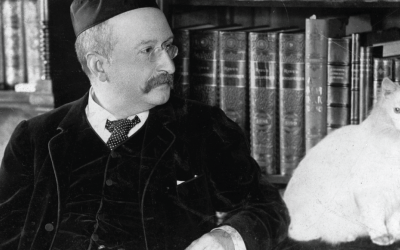Peter Boghossian and James Lindsay on the contemporary sophistry that's poisoning academic philosophy.
Both of us have benefited from reading and pondering the rich heritage of Western philosophy, and one of us has spent decades teaching and publishing as an academic philosopher. Yet we’ve come, reluctantly, to a pessimistic conclusion about philosophy in its current form. Very often -- far more often than not -- the academic study of philosophy inverts and poisons our intellectual lives. That is, it makes our epistemic situation worse by training us to be good at rationalising bad ideas but incapable of recognising good ideas.
In The Believing Brain: From Ghosts and Gods to Politics and Conspiracies (2012) and Why People Believe Weird Things (2002), social scientist and Skeptic magazine editor Michael Shermer articulates why smart people believe weird things. It’s because smarter and more educated people are better at rationalising beliefs they arrived at for non-smart reasons. In other words, really smart people are extremely good at coming up with reasons to justify whatever conclusions they happen to have latched onto. Or instead, they become attached to their theoretical models, and, through some combination of confirmation bias and its close cousins the hindsight bias and the desirability bias, twist the data to support their preferred conclusions.
Academic philosophers are particularly adept at examining hypothetical or counterfactual situations, defending essentially semantic conclusions (even if worded as metaphysical discoveries), and developing endless streams of esoteric ideas that most people find vacuous or irrelevant. Rival philosophers wrangle about this with the ingenuity of lawyers litigating a difficult case. Such sophistry is a waste of time and resources, but at least it is not actively harmful.
However, the effect described by Shermer is magnified when groups of smart people get together and lend their collective intellectual talents to justifying the moral fashions of the day. Here, academic philosophers can be more damaging to themselves, each other, and modern societies’ broader understanding of the problems confronting them.
When defending moral fashions, advocates think they’re better people because they actively promote certain ideas -- morally superior ideas in fact -- and they have a built in, nurturing, and supportive community that encourages and rewards them for doing so. This can create a feedback loop through what psychologists call post-hoc rationalisation, which is a process by which people will rationalise their moral intuitions after having felt them, and therefore wrongly attribute their intuitive claims to a process of moral reasoning. Smart people, especially philosophers trained in the arts of argumentation and logic, tend to have special aptitude in this regard.
The problems of rationalisation, confirmation bias, hindsight bias, and desirability bias are conspicuous in “soft” academic disciplines where conclusions are not kept on a leash by empirical testing. This applies, to varying extents, across the entirety of the humanities and much of the social and behavioural sciences. We can’t adjudicate where the problems are worst, but they are conspicuous in the discipline of philosophy -- virtually all academic philosophy departments have become departments of sophistry.
To address the most serious aspect of this problem, we raise the following questions. Is there a single philosophy department remaining in the English-speaking world that has not fallen sway to obsessing over demographic diversity -- racial, sexual, and otherwise -- and consequently to privileging this over intellectual diversity? Or even one philosophy department actively resisting the contemporary push to change hiring, promotion, and tenure practices to benefit racial minorities and people who self-identify as women or a minority sexuality? In many cases the bar is simply lowered -- see for example the Guardian’s recent report that University of Technology Sydney reduced entry scores for female applicants in male-dominated courses. This compromises intellectual and academic standards in order to bring “diversity” into academic programs. Given that even the profoundly conservative Southern Baptist Theological Seminary has enacted changes like these, it seems unlikely that there are. When facing such issues, philosophers display their usual proficiency at advocating ideas for which there’s scant evidence in support, and even significant evidence against.
At its worst, the obsession with assisting historically disadvantaged groups resembles a form of religious zealotry, complete with a tacit accord as to which ideas are beyond the pale of toleration. This can lead to the sanction, punishment, public shaming, and attempted professional disgracing of dissenters from the current orthodoxy. As an academic discipline, philosophy is not unique in this regard, but it is certainly not immune. Take just one example: the case of Rebecca Tuvel, who published “In Defense of Transracialism” in the feminist philosophy journal Hypatia (2017). Tuvel ran afoul of the prevailing moral current when she argued, “[s]ince we should accept transgender individuals’ decisions to change sexes, we should also accept transracial individuals’ decisions to change races.”
Despite her background and credentials in feminist scholarship, Tuvel failed to realise that gender and race are theorised so differently by queer theory and critical race theory, respectively, as to be incommensurable. Her article passed through the usual process of peer review, and any fair reading will show that it was a thoughtful, polished, and well-reasoned contribution to contemporary debates about group identities. To say the least, it had sufficient merit to justify being published in a specialist philosophy journal. Nonetheless, Tuvel paid an extremely high price for heresy. A mob of academics and students, many of them professional philosophers with impressive credentials, came for her on social media, wrote outraged letters to her institution, and made public demands that her piece be retracted -- even while some participants in the mob apologised to her in private.
This outcry was so severe that it not only impacted Tuvel but severely damaged the reputation of Hypatia, which was deemed complicit in the offense and rocked by scandal. This included being the target of a petition with over 800 signatures -- including members of Tuvel’s dissertation committee -- and it resulted in a complete overhaul of the journal’s editorial board and board of directors. All of this represents a betrayal of the core elements of philosophy: argument, disputation, dialectic, and publishing counterarguments and rebuttals in peer-reviewed journals. Because philosophy’s traditional issues defy any definitive resolution, the discipline tended, in the past, to show a laudable tolerance for divergent opinions. But this can no longer be expected when the questions under discussion relate to deeply moralised subject matter such as the truth claims and material interests of disadvantaged groups.
In fairness, some philosophers did defend Tuvel (e.g., Brian Leiter, Russell Blackford, and Daniel Kaufman), and some continue to defend a disciplinary norm that no ideas are beyond rational criticism. We wish those colleagues luck, but they’re fighting a losing battle. Too many philosophers have made clear that they view ideas borrowed from theorists of gender and race as incontestable doctrine.
We once believed, naïvely, that being a philosopher was a prophylactic against believing bad ideas. But it’s just the opposite. Being a philosopher too often blinds you to your ideology. It’s a tragedy worsened by irony: by becoming proficient at reasoning backward from a conclusion, philosophers have strayed from the pursuit of wisdom by thinking they’ve found it. Philosophers are not, and probably never were, the gatekeepers of sanity. They’re very often people who’ve taught themselves to be less capable than most of resisting the moral currents of the age.
Peter Boghossian is a full-time faculty member in the Department of Philosophy at Portland State University and coauthor of How to Have Impossible Conversations (Da Capo Press). @peterboghossian
James Lindsay is a freelance writer and researcher and is coauthor of How to Have Impossible Conversations (Da Capo Press).@ConceptualJames
You might also like...















